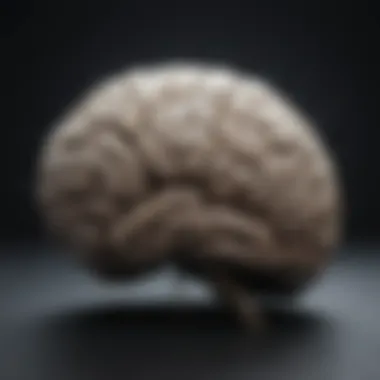Understanding Depression in the Brain: An In-Depth Exploration


Intro
Depression, a condition often misunderstood, is more than just a simple feeling of sadness. It is deeply rooted in the brain's neurobiology. Understanding how depression operates requires an exploration beyond surface-level symptoms. The intricate connections between biological structures, neurotransmitter functions, and genetic influences are essential.
In this article, we will dissect these relationships to uncover the neurobiological landscapes that shape depression. Key research findings will provide the foundation, while complex concepts will be broken down for clarity. Our goal is to integrate recent advances in the field and present them in a manner that is engaging and informative for students, researchers, and professionals alike.
Key Research Findings
Overview of Recent Discoveries
Recent studies have highlighted significant advancements in understanding the mechanisms of depression. Research indicates that certain regions of the brain, like the prefrontal cortex and hippocampus, show altered structures in individuals with depression. Neuroimaging techniques, such as MRI, have allowed scientists to map these changes. For instance, the volume reduction in the hippocampus is often observed in depressed patients, suggesting a link between depression and impaired memory.
Moreover, neurotransmitter systems are critically involved. Imbalances, particularly in serotonin and dopamine, are well-established in contributing to the onset of depressive symptoms. Current studies demonstrate that therapeutic interventions targeting these imbalances can be effective, underscoring the significance of neurotransmitter regulation in treatment strategies.
Significance of Findings in the Field
These findings are not just academic; they have profound implications. Understanding the biological underpinnings of depression aids in developing targeted therapies. By recognizing how structural changes relate to symptoms, practitioners can tailor interventions more effectively.
Moreover, genetic studies reveal susceptibility factors that may predispose individuals to depression, making personalized approaches to treatment a possibility. As research evolves, the integration of biological insights into clinical practice becomes increasingly crucial.
"By synthesizing biological understanding with clinical strategies, we pave the way for innovative treatment modalities."
Breakdown of Complex Concepts
Simplification of Advanced Theories
The brain's architecture can be complex, but understanding it does not have to be. For example, the concept of neuroplasticity plays a crucial role in how we view depression. Neuroplasticity refers to the brain's ability to adapt and reorganize itself. It is essential to recognize that through this process, positive changes in brain function can occur, potentially mitigating depressive symptoms.
Equally, the role of inflammation is becoming clearer. Studies indicate that neuroinflammation can lead to changes in brain circuitry related to mood regulation. Thus, methods to manage inflammation may also hold therapeutic potential.
Visual Aids and Infographics
To facilitate better comprehension, visual aids such as brain diagrams highlighting different regions affected by depression, or infographics detailing neurotransmitter pathways, can be immensely helpful. These tools provide a clearer picture of how depression manifests in the brain.
This exploration into the neurobiological aspects of depression is crucial. As we better understand these mechanisms, we can foster greater awareness and develop more effective therapeutic options, ultimately enhancing outcomes for those affected.
Prologue to Depression
The exploration of depression is crucial, given its pervasive nature and profound impact on individuals and society. Depression is not merely a transient emotional state; it is a complex mental health disorder that affects millions worldwide. Understanding its intricacies allows for better detection, management, and treatment.
Defining Depression
Depression can be defined as a mood disorder characterized by persistent feelings of sadness, loss of interest, and a range of emotional and physical problems. It is essential to recognize that depression can manifest in various forms, such as Major Depressive Disorder, Persistent Depressive Disorder, and Seasonal Affective Disorder. Each type presents unique symptoms and challenges. Generally, depression can affect one’s ability to function in daily life, leading to impaired work performance, social withdrawal, and diminished overall well-being. The Diagnostic and Statistical Manual of Mental Disorders (DSM-5) provides criteria for diagnosing depression, helping healthcare professionals identify it in patients effectively. Understanding these definitions lays a foundation for further investigation into the neurobiological mechanisms behind this condition.
Prevalence and Impact
The impact of depression is staggering. It is one of the leading causes of disability globally. According to the World Health Organization, more than 264 million people of all ages experience depression. The prevalence has been noted to increase in recent years, partly due to pressures from social media and global issues.
The repercussions of untreated depression extend beyond the individuals who suffer. Economically, the cost on healthcare systems is significant, manifesting as lost productivity, increased healthcare utilization, and higher rates of disability claims. Additionally, the emotional toll on families and communities cannot be overlooked. Relationships suffer, and the quality of life declines, further entrenching the individual in this debilitating cycle.
"Understanding depression’s prevalence is essential for developing targeted interventions that can significantly improve the quality of life for affected individuals."
As we delve deeper into the neurobiological mechanisms of depression, it becomes evident that comprehensively understanding its prevalence aids in advocating for better treatment options and policy discussions.
The exploration into the brain’s biological underpinnings of depression is necessary to foster a clearer understanding and establish effective intervention strategies.
Neurobiological Mechanisms of Depression
Understanding the neurobiological mechanisms of depression is essential for comprehending the broader implications of the condition. This section examines how structural and functional alterations in the brain contribute to depressive symptoms. By revealing the intricacies of brain chemistry and pathways, we can unveil potential avenues for effective interventions. Addressing these mechanisms aids in developing targeted therapies and sheds light on the biological underpinnings of this complex mental health disorder.
The Brain's Structure in Depression


Changes in Brain Regions
Changes in brain regions play a pivotal role in how depression manifests. Research indicates that several areas of the brain show structural changes in individuals with depression. Noteworthy alterations are seen in the hippocampus, prefrontal cortex, and amygdala. Most significantly, the hippocampus often exhibits reduced volume. This reduction correlates with memory deficits and trouble navigating emotions. The structural modifications in brain regions underscore the physical reality of depression, shifting the perspective from a purely psychological issue to one grounded in biological change. These findings highlight the importance of identifying brain health as significant to mental well-being.
The Role of the Prefrontal Cortex
The prefrontal cortex is crucial in higher cognitive functions and emotional regulation. In depression, this region often shows reduced activity. This decreased activation contributes to impaired decision-making and emotional responses. Because many therapeutic approaches focus on enhancing prefrontal functionality, understanding its role is key. The decision to emphasize this structure in the article is beneficial as it links cognition and emotion. However, the challenge remains in attributing causality, as it is unclear if structural changes drive depressive symptoms or if symptoms lead to alterations in the prefrontal cortex.
The Amygdala's Functionality
The amygdala is often termed the emotional center of the brain. In depression, this area may become hyperactive, leading to exaggerated emotional responses. This hyperactivity can intensify feelings like sadness and anxiety. Highlighting the amygdala is important as it forms the basis of emotional reactivity. The unique feature of its sensitivity to emotional stimuli helps us appreciate why emotional regulation is often disrupted in depressed individuals. However, the downside is that focusing solely on the amygdala may oversimplify the complexities of emotional experiences and their variations across different individuals.
Neurotransmitter Dynamics
Dopamine and Reward Pathways
Dopamine's role in reward pathways is crucial when considering depression. It is linked to pleasure and motivation. Reduced dopamine activity can translate into anhedonia, a core symptom of depression. Research has shown that individuals with depression often have altered dopamine dynamics. This imbalance in reward signaling offers insight into the lack of motivation and pleasure experienced during depressive episodes. This characteristic provides a compelling focus point for our article, as treatments targeting dopamine pathways might alleviate core symptoms. Yet, the complexity of dopamine's role means that oversimplification could lead to inadequate treatment strategies.
Serotonin's Influence
Serotonin is widely known for its influence on mood regulation. Its balance is critical for maintaining a stable emotional state. Low serotonin levels are frequently associated with depression and have made serotonin more prominent in therapeutic discussions. This is beneficial as it leads to a widely accepted focus on serotonergic treatments like selective serotonin reuptake inhibitors. However, the unique aspect of serotonin's multifaceted role, impacting many functions beyond mood, suggests that focusing narrowly on it could miss other significant factors contributing to depression.
Norepinephrine's Role
Norepinephrine is another neurotransmitter essential for mood regulation and response to stress. Altered norepinephrine levels may impact attention, arousal, and stress responses. The link between norepinephrine dysregulation and symptoms like fatigue highlights its significance in understanding depression. This characteristic allows us to delve into its treatment implications. However, the specific effects of norepinephrine levels can vary widely among individuals, introducing some challenges in generalizing its impact.
The Gut-Brain Axis
Microbiome and Mental Health
Current research emphasizes the connection between the microbiome and mental health, underscoring the gut-brain axis's significance in depression. An imbalance in gut bacteria may influence neurotransmitter production and inflammation levels. This relationship offers valuable insights and potential new treatment avenues targeting gut health. Its prominence in the article reflects a growing recognition of the microbiome’s impact on mental well-being. The unique feature here involves how altering the microbiome could open new doors for treating mental health issues. However, further research is needed to fully understand these complex interactions.
Communication Pathways
Communication pathways between the gut and the brain are increasingly recognized for their roles in mental health. These pathways involve hormonal signaling, immune responses, and neurotransmitter regulation. Their significance in the context of depression emphasizes that mental health is not isolated to brain processes alone. This connection offers a comprehensive understanding of how body systems interact with mental health. The downside is that these pathways add layers of complexity, making it challenging to pinpoint precisely how they contribute to depression.
Potential Treatment Avenues
Exploring potential treatment avenues stemming from gut health has gained traction. Probiotics and dietary adjustments may influence mental health through the gut-brain axis, showing promise as adjunct therapies. These options benefit our article by highlighting integrative approaches towards treatment. The unique feature is how these approaches may not only alleviate symptoms but also promote overall health, suggesting a holistic view of treatment. Nevertheless, this area of research is still emerging, and the benefits of such therapies may vary among individuals, warranting cautious optimism.
Inflammation and Depression
Inflammation's relationship with depression is becoming a crucial area of study. This topic highlights how immune responses may significantly influence mental health. Understanding inflammation in the context of depression leads to better insight into treatment strategies. Researchers are investigating the biological interplay between the immune system and brain functions, shedding light on symptoms and potential interventions.
Neuroinflammatory Processes
Role of Cytokines
Cytokines are signaling molecules that mediate immune responses. In depression, certain cytokines can become elevated, indicating chronic inflammation. They are critical because they can disrupt neurotransmitter function and alter mood regulation. This makes them a significant focus for understanding depression's neurobiological aspects.
One relevant characteristic of cytokines is their ability to affect brain chemistry. When present in high amounts, they can lead to lower serotonin levels, which are essential in mood stabilization. This interconnectedness highlights why researchers look at cytokines closely; they impact how the brain responds to stress and irritants.
The unique feature of studying cytokines is their potential as biomarkers for depression. Identifying cytokine levels in the blood may help predict the likelihood of depression. This aspect can be beneficial in diagnosing patients, but it also presents challenges in standardization of tests and interpretation of results.
Effects on Neurotransmission
Neurotransmission is the process of communication between neurons, crucial for mental health. In depression, inflammatory factors can inhibit this process. Increased levels of pro-inflammatory cytokines may reduce serotonin and dopamine availability, leading to depressive symptoms.
The fundamental concern here is the negative feedback loop created by neuroinflammation disrupting neurotransmission. When these neurotransmitters are insufficient, mood disorders can escalate. This is a prominent area of interest as it bridges biology and depression.
One major advantage of understanding these effects is the potential for targeted therapies. If we can identify how neurotransmission is affected by inflammation, new treatment avenues can be opened. However, there may be disadvantages; targeting neurotransmitters alone is not sufficient without addressing broader systemic inflammation.


Links to Chronic Stress
Chronic stress is often linked to heightened inflammation. It may trigger a cascade of inflammatory responses within the body, including elevated cytokine levels. Understanding this link is key because it unveils how stress can contribute to the onset of depressive disorders.
A notable characteristic of this connection is that chronic stress can lead to lasting changes in brain architecture, compounding the effects of depression. By focusing on this relationship, researchers can better develop intervention strategies.
One unique aspect is the role of lifestyle factors, such as diet and exercise, in moderating stress-induced inflammation. This provides a set of practical approaches besides medication, emphasizing holistic treatment. However, individual variability makes predicting responses to stress challenging, which could complicate treatment establishment.
Biomarkers of Inflammation
Identifying Depression through Blood Tests
Blood tests can analyze inflammation markers like cytokines to help diagnose depression. This innovation could offer a more objective measure than current subjective assessments. This characteristic makes blood tests a notable advancement in mental health diagnostics.
A key benefit is that this approach can lead to earlier identification of depressive disorders. Detecting inflammation may assist healthcare providers in determining if treatment is necessary. However, reliance on blood tests also has disadvantages; results must be correlated with comprehensive evaluations.
Research Findings and Implications
Ongoing research into the relationship between inflammation and depression shows promising implications for future treatment. For instance, anti-inflammatory medications could potentially alleviate depressive symptoms. This link highlights the importance of highlighting inflammation's role in depression.
A significant characteristic of these findings is their potential application in personalized medicine. Tailoring treatments based on individual inflammatory profiles can optimize outcomes. Nonetheless, establishing causal relationships remains a complex issue. Treatment responses vary widely across individuals, suggesting a need for more extensive studies to confirm findings.
Genetic Factors in Depression
Genetic factors play a crucial role in understanding depression, influencing both its onset and severity. This section delves into how inherited traits contribute to this mental health condition. By assessing heritability and the impact of genetics, we gain comprehensive insight into predispositions and risks. Such understanding is essential, not just for scientific curiosity, but for developing targeted therapies and interventions.
Heritability of Depression
Family Studies
Family studies focus on the individuals within familial units to identify patterns of depression. They reveal that depression often runs in families, suggesting a genetic link. The key characteristic here is the observable trends in familial rates of depression compared to the general population. This makes family studies a beneficial resource for understanding hereditary mental health risks.
However, their disadvantage lies in confounding variables such as environment and shared experiences. These can complicate the interpretation of findings. Thus, while family studies highlight potential genetic risks, contextual factors must be carefully considered.
Twin Studies
Twin studies further explore heritability by comparing the similarities of identical twins to those of fraternal twins. This design allows researchers to isolate the influence of genetics from environmental factors. Twin studies are particularly valuable as they offer a clear method for estimating heritability through statistical analysis. Their key feature is the comparison of concordance rates between twin types, offering direct evidence of the genetic contribution to depression.
Despite their strengths, the unique environments that identical twins may share still present a limitation. Moreover, public access to twins may not always represent the broader population, thus affecting the generalizability of results.
Gene-Environment Interactions
Gene-environment interactions consider how genetic predispositions are influenced by environmental factors. While a genetic predisposition to depression may exist, the environment can trigger the onset of symptoms. This interaction is vital for understanding the complexity of depression. The unique feature of this aspect lies in its ability to frame depression not purely as a genetic disorder but as a condition influenced by both biological and environmental conditions.
The advantage here is that it opens pathways to preventative measures that target environmental influences. Conversely, understanding these interactions can be intricate, adding layers of complexity to the simplistic narratives around genetics and mental health.
Key Genetic Findings
Candidate Genes in Focus
Research has identified several candidate genes associated with depression, including the serotonin transporter gene (SLC6A4). The focus on these genes helps to elucidate the biological pathways involved in depression. By identifying specific genetic variants that predispose individuals to depression, researchers bring attention to the molecular mechanisms underlying the disorder. The unique feature of this research is its potential to guide drug development.
However, the landscape of genetics is complex. Multiple genes may interact rather than one single gene being responsible. Thus, while focusing on candidate genes is a popular approach, it can oversimplify the multidimensional nature of depression.
Implications for Treatment
Understanding genetic factors has significant implications for treatment strategies. Knowledge of genetic predispositions can aid in the development of personalized medicine approaches. For example, specific genetic profiles might predict responses to different antidepressants, allowing for tailored therapeutic plans. This characteristic makes genetic understanding vital for treatment development.
Nonetheless, while promising, this approach faces challenges. Genetic testing can be expensive and not universally accessible. Moreover, ethical considerations about genetic privacy and discrimination also arise, creating nuanced implications for practice.
"The intricate links between genetics and depression underscore the importance of a holistic approach to treatment and understanding mental health."


The review of genetic factors illustrates that while substantial strides have been made, the intricate nature of genetics and their interaction with environmental factors call for ongoing research and ethical consideration.
Therapeutic Approaches to Depression
The exploration of therapeutic approaches to depression is essential in understanding the condition. Various treatment modalities can lead to significant improvements in a person's mental health. By examining pharmacological treatments, psychotherapy, and emerging therapies, we can appreciate how each method contributes to alleviating symptoms. Additionally, understanding the benefits and considerations associated with these approaches enhances our knowledge of managing depression effectively.
Pharmacological Treatments
Antidepressants and Their Mechanisms
Antidepressants serve a crucial role in the management of depression. Specifically, they work by altering the balance of neurotransmitters in the brain, which are chemicals that transmit signals between nerve cells. Selective serotonin reuptake inhibitors (SSRIs), like Fluoxetine, are common examples. These medications primarily focus on increasing serotonin levels, which can enhance mood and reduce feelings of sadness. Their widespread use stems from their proven efficacy and relatively favorably side-effect profile.
The key characteristic of antidepressants is their ability to stabilize mood over time. While some patients may experience relief from symptoms within a few weeks, others may take longer, requiring patience and regular monitoring by a healthcare professional. An advantage of antidepressants is their ability to bring about substantial changes in neurotransmitter levels. However, they are not without disadvantages; side effects can include nausea, weight gain, and sexual dysfunction, which can lead to non-compliance in treatment.
Ongoing Research in New Medications
Research continues to evolve in the realm of new medications for depression. Innovative studies focus on developing faster-acting antidepressants and formulations with improved side effect profiles. For example, compounds related to psychedelics, like Psilocybin, demonstrate promising effects in controlled settings. This research is significant because it opens new avenues for treatment, especially for those who do not respond to traditional antidepressants.
The key characteristic of ongoing research is its commitment to discovering effective alternatives. These new medications often exhibit different mechanisms of action than conventional antidepressants, which can lead to breakthroughs in treatment strategies. A unique feature is the rapid onset of effects found in some experimental therapies. As such, they may offer advantages for individuals in chronic distress. However, ethical considerations and the need for extensive clinical trials pose potential challenges to generalizability and accessibility.
Psychotherapy and Its Role
Cognitive Behavioral Therapy
Cognitive Behavioral Therapy (CBT) is highly regarded as an effective treatment for depression. This psychotherapeutic approach focuses on identifying and restructuring negative thought patterns that contribute to the condition. By teaching patients how to recognize and challenge harmful thinking, CBT empowers individuals to develop healthier attitudes and coping mechanisms.
The critical aspect of CBT is its structured format, which often includes homework assignments and exercises designed to reinforce learning. Its popularity derives from its evidence-based results, demonstrating substantial improvements in depressive symptoms. Additionally, CBT’s practical nature means that patients can learn skills that last beyond therapy sessions. However, it requires active participation and may take time to achieve optimal results.
Interpersonal Therapy
Interpersonal Therapy (IPT) also plays a pivotal role in managing depression. IPT centers around improving interpersonal relationships and social functioning, which are often affected by depressive symptoms. It focuses on identifying and addressing specific relational issues that contribute to a patient's difficulties.
The unique feature of IPT is its emphasis on social context. This therapy recognizes that depression often emerges or worsens due to social challenges. As a result, IPT is both a beneficial and supportive choice for fostering communication and connection. While IPT is generally effective, it may not be suitable for individuals seeking immediate symptom relief, as the process is gradual.
Emerging Treatments
Transcranial Magnetic Stimulation
Transcranial Magnetic Stimulation (TMS) has gained attention as an innovative treatment for depression, particularly for those who have not benefited from conventional therapies. TMS is a non-invasive procedure that utilizes magnetic fields to stimulate nerve cells in the brain. The primary goal is to enhance neural activity in areas involved in mood regulation.
The notable characteristic of TMS is its precise targeting. Treatments are conducted using a customized approach, making it a gentle and controlled way to alter brain activity. Many individuals report minimal side effects compared to those experienced with medications, which adds to its appeal. However, the necessity of multiple sessions and potential costs can create barriers for access in some cases.
Ketamine and other Experimental Therapies
Ketamine is a groundbreaking treatment that contrasts sharply with traditional antidepressants. Initially used as an anesthetic, it exhibits rapid antidepressant effects when administered in smaller doses. Ketamine treatment has become increasingly popular, particularly for individuals with treatment-resistant depression.
The highlight of ketamine is its fast-acting nature; many patients experience relief within hours rather than weeks. This unique feature makes it a valuable option for acute depressive episodes. Furthermore, emerging research explores other compounds that share ketamine's benefits but perhaps with fewer side effects. However, long-term effects and safety remain areas needing further investigation, as the current body of evidence is still evolving.
Understanding these therapeutic approaches illustrates the multifaceted strategies available for combating depression. Each method addresses the condition from different angles, emphasizing the need for personalized treatment plans.
End
Understanding depression through its neurological and biological dimensions is paramount in unraveling its complexities. The implications of this understanding are manifold, influencing treatment approaches, early diagnosis, and the development of targeted therapies. Depression does not exist in a vacuum; it affects millions globally, and recognizing the neural correlates can foster a more empathetic response to those struggling with this affliction.
Summary of Findings
In this article, we have explored crucial aspects of depression, particularly its neurobiological roots. Here is a brief overview of key findings:
- Neurobiological Mechanisms: Depression is closely linked to alterations in brain structure and function. Changes in the prefrontal cortex and the amygdala significantly influence mood regulation and emotional responses.
- Neurotransmitter Dynamics: An imbalance of neurotransmitters—dopamine, serotonin, and norepinephrine—plays a pivotal role in the onset and persistence of depressive symptoms, impacting reward pathways and emotional stability.
- Inflammation: Neuroinflammatory processes contribute to depression. Recent discoveries highlight how cytokines affect neurotransmission and relate to chronic stress, marking a crucial link between physical health and mental well-being.
- Genetic Factors: Research indicates that genetic predispositions, evident in family and twin studies, significantly influence individual vulnerabilities to depression and its manifestations.
- Therapeutic Approaches: Various treatments are emerging, ranging from established pharmacological options like antidepressants to innovative therapies such as transcranial magnetic stimulation and ketamine infusions, reflecting an evolving understanding of this condition.
Overall, the synthesis of these findings illustrates that depression is not simply a matter of mood but a profoundly intricate interplay of biological, psychological, and social factors. Understanding these dimensions shapes how we conceptualize and treat this pervasive mental health disorder.
Future Directions in Research
As the field of depression research advances, several promising avenues warrant exploration:
- Neuroscientific Advances: Continued investigation into brain imaging technology can offer deeper insights into structural and functional changes associated with depression.
- Precision Medicine: Research should focus on personalized treatment strategies, integrating genetic, environmental, and lifestyle factors to enhance therapeutic efficacy.
- Longitudinal Studies: Future research can benefit from long-term studies tracking the progression of depression and its cerebral impacts over time, offering valuable data for early interventions.
- Interdisciplinary Approaches: Combining findings from neuroscience, psychology, and social sciences could foster a more holistic understanding of depression, potentially unveiling novel treatment paradigms.
- Public Health Initiatives: Addressing stigma and promoting mental health literacy in communities can aid in recognizing and treating depression early, emphasizing the importance of mental wellness.
By directing efforts in these areas, researchers can pave the way for innovative therapies, improved patient outcomes, and ultimately, a broader societal understanding of mental health challenges.















